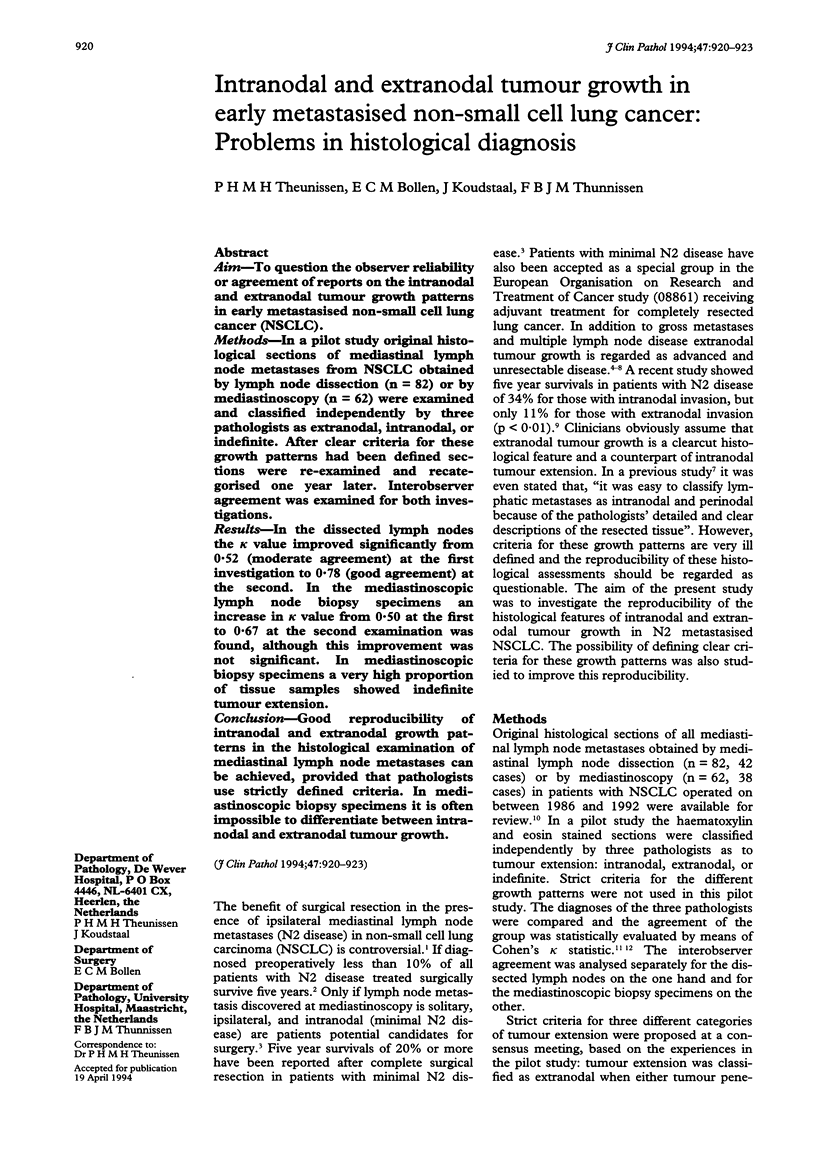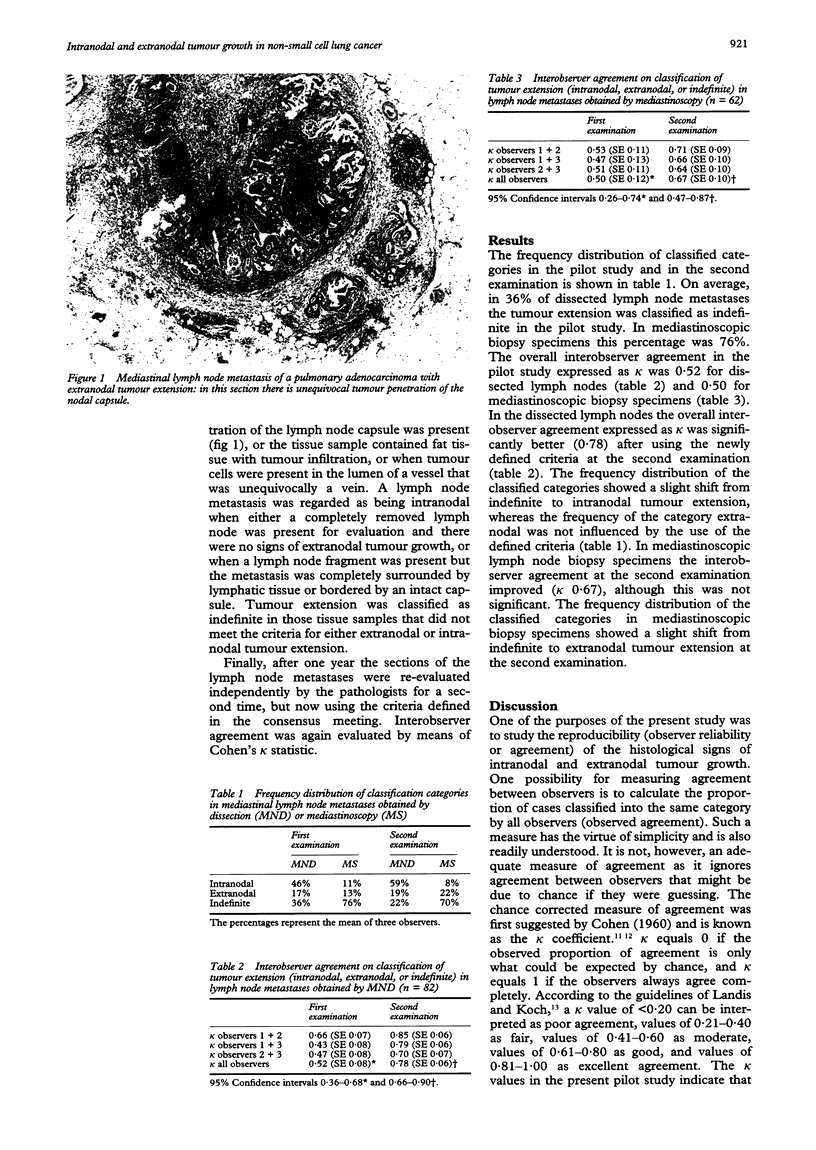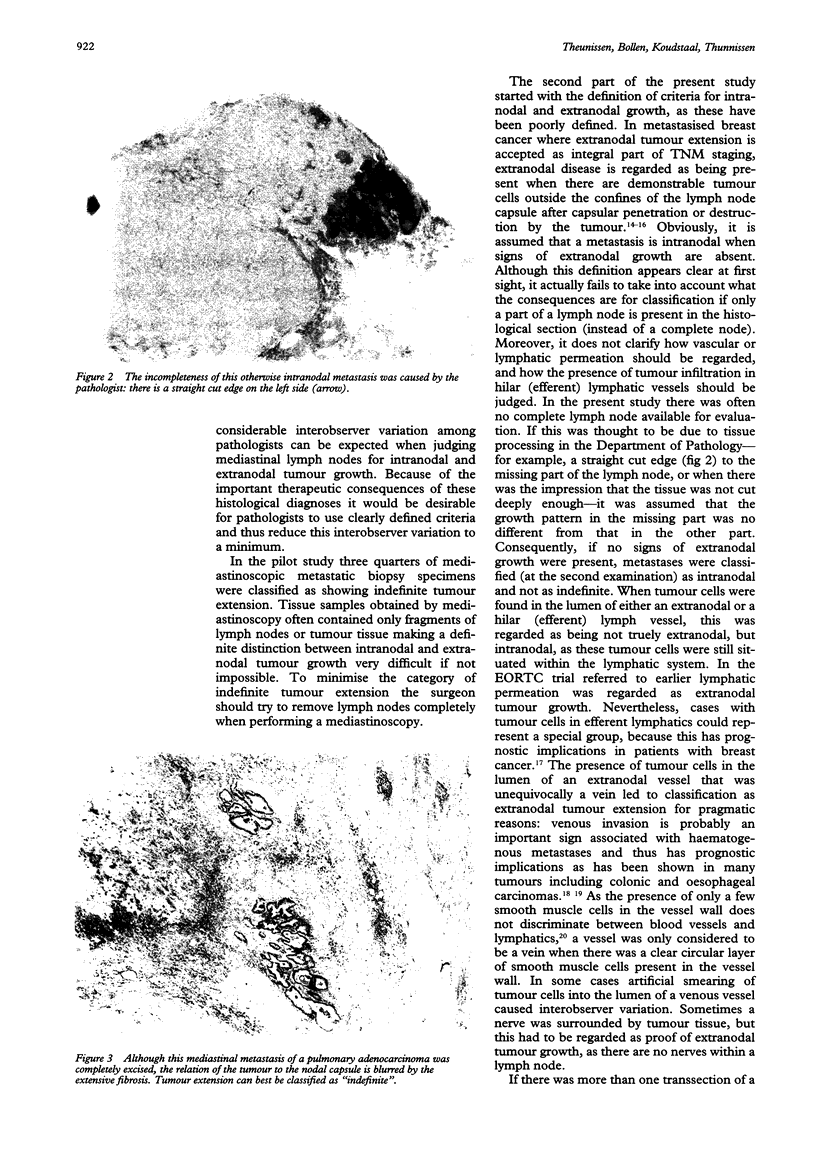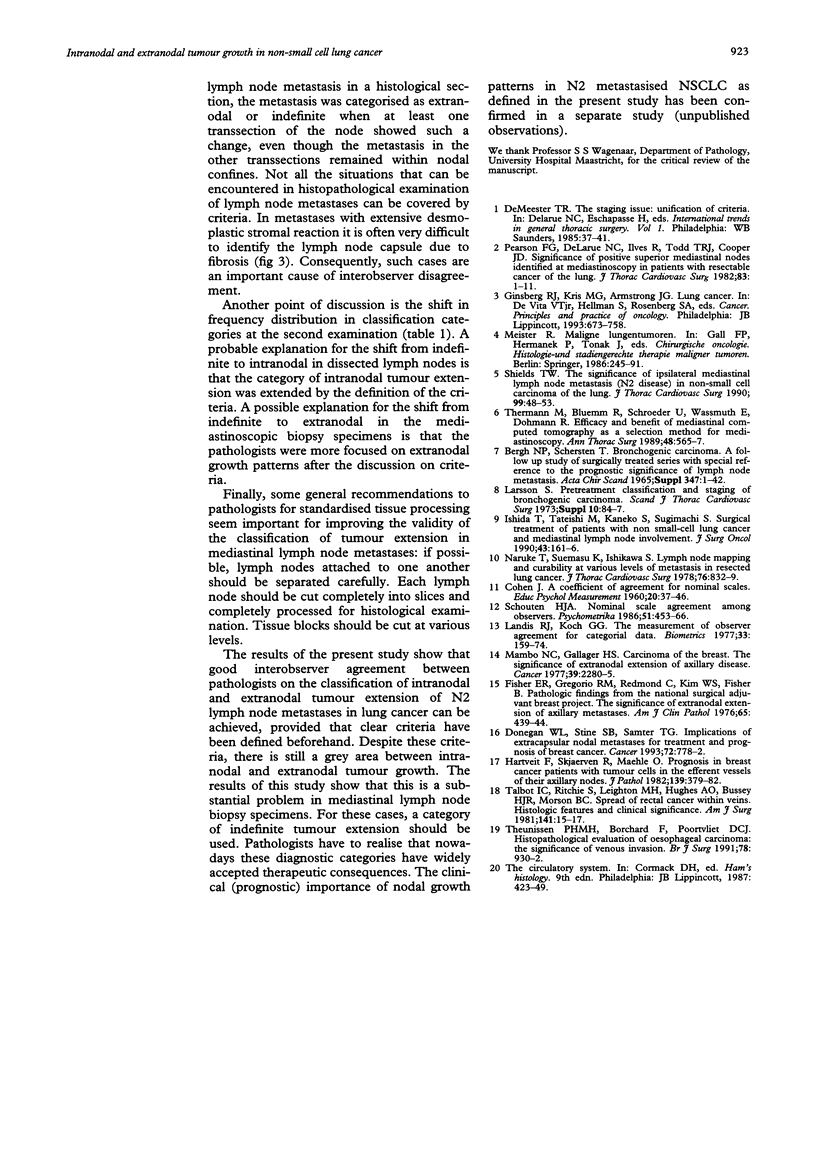Abstract
AIM--To question the observer reliability or agreement of reports on the intranodal and extranodal tumour growth patterns in early metastasised non-small cell lung cancer (NSCLC). METHODS--In a pilot study original histological sections of mediastinal lymph node metastases from NSCLC obtained by lymph node dissection (n = 82) or by mediastinoscopy (n = 62) were examined and classified independently by three pathologists as extranodal, intranodal, or indefinite. After clear criteria for these growth patterns had been defined sections were re-examined and recategorised one year later. Interobserver agreement was examined for both investigations. RESULTS--In the dissected lymph nodes the kappa value improved significantly from 0.52 (moderate agreement) at the first investigation to 0.72 (good agreement) at the second. In the mediastinoscopic lymph node biopsy specimens an increase in kappa value from 0.50 at the first to 0.67 at the second examination was found, although this improvement was not significant. In mediastinoscopic biopsy specimens a very high proportion of tissue samples showed indefinite tumour extension. CONCLUSION--Good reproducibility of intranodal and extranodal growth patterns in the histological examination of mediastinal lymph node metastases can be achieved, provided that pathologists use strictly defined criteria. In mediastinoscopic biopsy specimens it is often impossible to differentiate between intranodal and extranodal tumour growth.
Full text
PDF



Images in this article
Selected References
These references are in PubMed. This may not be the complete list of references from this article.
- Donegan W. L., Stine S. B., Samter T. G. Implications of extracapsular nodal metastases for treatment and prognosis of breast cancer. Cancer. 1993 Aug 1;72(3):778–782. doi: 10.1002/1097-0142(19930801)72:3<778::aid-cncr2820720324>3.0.co;2-j. [DOI] [PubMed] [Google Scholar]
- Fisher E. R., Gregorio R. M., Redmond C., Kim W. S., Fisher B. Pathologic findings from the national surgical adjuvant breast project. (Protocol no. 4). III. The significance of extranodal extension of axillary metastases. Am J Clin Pathol. 1976 Apr;65(4):439–444. doi: 10.1093/ajcp/65.4.439. [DOI] [PubMed] [Google Scholar]
- Hartveit F., Skjaerven R., Maehle B. O. Prognosis in breast cancer patients with tumour cells in the efferent vessels of their axillary nodes. J Pathol. 1983 Mar;139(3):379–382. doi: 10.1002/path.1711390312. [DOI] [PubMed] [Google Scholar]
- Ishida T., Tateishi M., Kaneko S., Sugimachi K. Surgical treatment of patients with nonsmall-cell lung cancer and mediastinal lymph node involvement. J Surg Oncol. 1990 Mar;43(3):161–166. doi: 10.1002/jso.2930430308. [DOI] [PubMed] [Google Scholar]
- Landis J. R., Koch G. G. The measurement of observer agreement for categorical data. Biometrics. 1977 Mar;33(1):159–174. [PubMed] [Google Scholar]
- Mambo N. C., Gallager H. S. Carcinoma of the breast: the prognostic significance of extranodal extension of axillary disease. Cancer. 1977 May;39(5):2280–2285. doi: 10.1002/1097-0142(197705)39:5<2280::aid-cncr2820390548>3.0.co;2-3. [DOI] [PubMed] [Google Scholar]
- Naruke T., Suemasu K., Ishikawa S. Lymph node mapping and curability at various levels of metastasis in resected lung cancer. J Thorac Cardiovasc Surg. 1978 Dec;76(6):832–839. [PubMed] [Google Scholar]
- Pearson F. G., DeLarue N. C., Ilves R., Todd T. R., Cooper J. D. Significance of positive superior mediastinal nodes identified at mediastinoscopy in patients with resectable cancer of the lung. J Thorac Cardiovasc Surg. 1982 Jan;83(1):1–11. [PubMed] [Google Scholar]
- Shields T. W. The significance of ipsilateral mediastinal lymph node metastasis (N2 disease) in non-small cell carcinoma of the lung. A commentary. J Thorac Cardiovasc Surg. 1990 Jan;99(1):48–53. [PubMed] [Google Scholar]
- Talbot I. C., Ritchie S., Leighton M. H., Hughes A. O., Bussey H. J., Morson B. C. Spread of rectal cancer within veins. Histologic features and clinical significance. Am J Surg. 1981 Jan;141(1):15–17. doi: 10.1016/0002-9610(81)90004-0. [DOI] [PubMed] [Google Scholar]
- Thermann M., Bluemm R., Schroeder U., Wassmuth E., Dohmann R. Efficacy and benefit of mediastinal computed tomography as a selection method for mediastinoscopy. Ann Thorac Surg. 1989 Oct;48(4):565–567. doi: 10.1016/s0003-4975(10)66864-6. [DOI] [PubMed] [Google Scholar]
- Theunissen P. H., Borchard F., Poortvliet D. C. Histopathological evaluation of oesophageal carcinoma: the significance of venous invasion. Br J Surg. 1991 Aug;78(8):930–932. doi: 10.1002/bjs.1800780811. [DOI] [PubMed] [Google Scholar]





